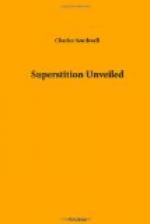The proper function of ‘Supernaturality or Wonder,’ according to Phrenologists, is to create belief in the reality of supernatural beings, and begets fondness for news, particularly if extravagant. Most likely then, such readers of this book as have that organ ‘large’ will be delighted with Newton’s rhodomontade about a God who resists nothing, feels nothing, and yet with condescension truly divine, not only contains all things, but permits them to move in His motionless and ‘universal presence;’ for ‘news’ more extravagant, never fell from the lips of an idiot, or adorned the pages of a prayer-book.
By the same great savan we are taught that God governs all, not as the soul of the world, but as the Lord and sovereign of all things: that it is in consequence of His sovereignty He is called the Lord God, the Universal Emperor—that the word God is relative, and relates itself with slaves—and that the Deity is the dominion or the sovereignty of God, not over his own body, as those think who look upon God as the soul of the world, but over slaves—from all which slavish reasoning, a plain man who had not been informed it was concocted by Europe’s pet philosopher, would infallibly conclude some unfortunate lunatic had given birth to it. That there is no creature now tenanting Bedlam who would or could scribble purer nonsense about God than this of Newton’s, we are well convinced—for how could the most frenzied of brains imagine anything more repugnant to every principle of good sense than a self-existent, eternal, omnipotent, omnipresent Being, creator of all the worlds, who acts the part of ‘universal emperor,’ and plays upon an infinitely larger scale, the same sort of game as Nicholas of Russia, or Mohammed of Egypt, plays upon a small scale. There cannot be slavery where there is no tyranny, and to say, as Newton did, that we stand in the name relation to a universal God, as a slave does to his earthly master, is practically to accuse such God, at reason’s bar of tyranny. If the word God is relative, and relate itself with slaves, it incontestably follows that all human beings are slaves, and Deity is by such reasoners degraded into the character of universal slave-driver. Really, theologians and others who declaim so bitterly against ‘blasphemers,’ and take such very stringent measures to punish ‘infidels’, who speaks or write of their God, should seriously consider whether the worst, that is, the least superstitious of infidel writers, ever penned a paragraph so disparaging to the character of that God they effect to adore, as the last quoted paragraph of Newton’s.




